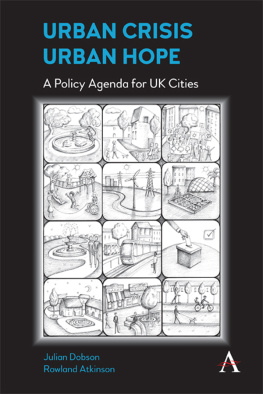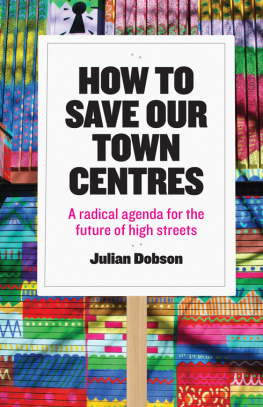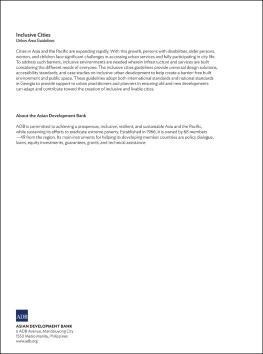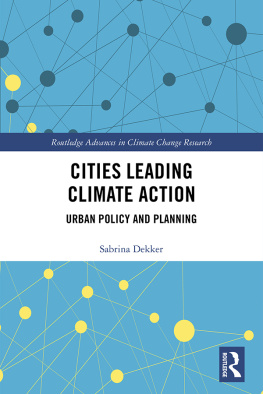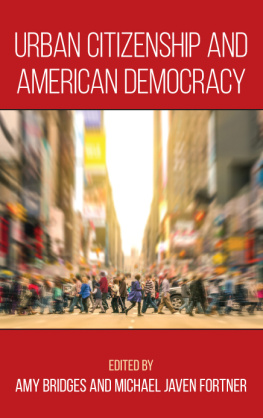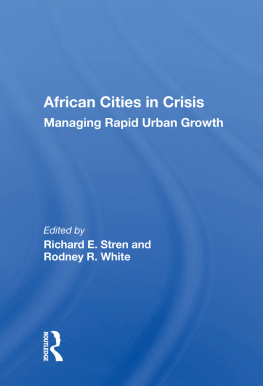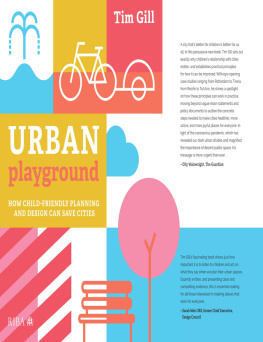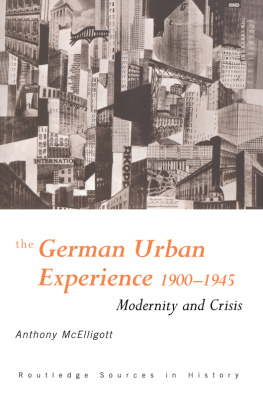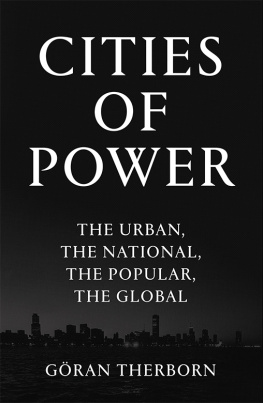Urban Crisis, Urban Hope
Anthem Environment and Sustainability Initiative
The Anthem Environment and Sustainability Initiative (AESI) seeks to push the frontiers of scholarship while simultaneously offering prescriptive and programmatic advice to policymakers and practitioners around the world. The programme publishes research monographs, professional and major reference works, upper-level textbooks and general interest titles. Professor Lawrence Susskind, as General Editor of AESI, oversees the below book series, each with its own series editor and an editorial board featuring scholars, practitioners and business experts keen to link theory and practice.
Strategies for Sustainable Development Series
Series Editor: Professor Lawrence Susskind (MIT)
Climate Change Science, Policy and Implementation
Series Editor: Dr. Brooke Hemming (US EPA)
Science Diplomacy: Managing Food, Energy and Water Sustainably
Series Editor: Professor Shafiqul Islam (Tufts University)
International Environmental Policy Series
Series Editor: Professor Saleem Ali (University of Delaware)
Big Data and Sustainable Cities Series
Series Editor: Professor Sarah Williams (MIT)
Climate Change and the Future of the North American City
Series Editor: Richardson Dilworth
(Center for Public Policy, Drexel University, USA)
Included within the AESI is the Anthem EnviroExperts Review. Through this online micro-review site, Anthem Press seeks to build a community of practice involving scientists, policy analysts and activists committed to creating a clearer and deeper understanding of how ecological systems at every level operate, and how they have been damaged by unsustainable development. This site publishes short reviews of important books or reports in the environmental field, broadly defined. Visit the website: www.anthemenviroexperts.com.
Urban Crisis, Urban Hope
A Policy Agenda for UK Cities
Edited by
Julian Dobson and Rowland Atkinson
Anthem Press
An imprint of Wimbledon Publishing Company
www.anthempress.com
This edition first published in UK and USA 2020
by ANTHEM PRESS
7576 Blackfriars Road, London SE1 8HA, UK
or PO Box 9779, London SW19 7ZG, UK
and
244 Madison Ave #116, New York, NY 10016, USA
2020 Julian Dobson and Rowland Atkinson editorial matter and selection; individual chapters individual contributors
The moral right of the authors has been asserted.
All rights reserved. Without limiting the rights under copyright reserved above, no part of this publication may be reproduced, stored or introduced into a retrieval system, or transmitted, in any form or by any means (electronic, mechanical, photocopying, recording or otherwise), without the prior written permission of both the copyright owner and the above publisher of this book.
British Library Cataloguing-in-Publication Data
A catalogue record for this book is available from the British Library.
ISBN-13: 978-1-78527-468-8 (Hbk)
ISBN-10: 1-78527-468-6 (Hbk)
ISBN-13: 978-1-78527-471-8 (Pbk)
ISBN-10: 1-78527-471-6 (Pbk)
This title is also available as an e-book.
CONTENTS
Julian Dobson and Rowland Atkinson
Madeleine Power
Niall Cooper
Emma Bimpson and Richard Goulding
Glyn Robbins
Rhiannon Corcoran
Graham Marshall
Elizabeth Cook and Anthony Ellis
Luke Billingham and Keir Irwin-Rogers
Bethany Thompson
Pam Warhurst
Ian Mell
Natalie Bennett
Loretta Lees
Kate Swade and Mark Walton
Annette Hastings
Julian Dobson
Simin Davoudi
Jess Steele
Rowland Atkinson and Julian Dobson
This book emerged from conversations in 2017 and an associated event on how Sheffield could become a better city. It quickly became clear that while our own city of Sheffield has a particular set of urban problems, the absence of urban policy at a national level in the United Kingdom and the complacency of central government towards local democracy and local public services are affecting all urban areas to different degrees. Here we would like to acknowledge the contributions of the many who have taken part in the conversations that have shaped this book, and those who took part in the Sheffield event that sparked this process.
There is an old joke about asking for directions. A person is driving through the countryside and comes to a village and stops to ask a man if he knows how to get to X. The man thinks about it for a bit and then answers: Yes, I know how to get there, but if I were you, I wouldnt start from here. Except, of course, we have no choice. And it is getting late. And we are running out of petrol. And the passengers in the back are thirsty. And a slow sense of panic is starting to set in. No one would start from here, if they had a choice; but here we are.
As I am sitting down to write, the air that encircles Delhi has turned toxic. The city has poisoned itself. Two weeks ago in Santiago, Chile, protesters torched metro stations following a fare hike on the public transport system. In Hong Kong, each Saturday, the streets are filled in defiance of a growing surveillance state that uses the infrastructure of the city to unblinkingly watch over its citizens. The latest addition to the Manhattan skyline is Hudson Yards, a bland, shiny enclave surmounted by Thomas Heatherwicks empty icon, the Vessel, that prides itself on being the most quantified space in New York. Closer to home, in London, there are more homeless people on the streets than in living memory. We are stressed out. Divided. Fearful of both violence and the police. Our neoliberal chickens are settling into their urban roost.
But, didnt we all as urbanists, human geographers, sociologists, historians and policy thinkers start our fascination with the urban world because we thought that there was something different, perhaps even liberating, about city life? And, despite the desperate reality on the ground today, didnt we share a feeling that the urban realm could be a place of nurture, of flourishing? We study the current problems, their origins and mutations, so that one might one day change them. We acknowledge that while the city is home to, and even multiplier of, many of the horrors of the conjuncture we find ourselves, it is also the crucible of its remedy. Is this enough to discern a glimmer of hope?
In the varied, engaged entries in this collection that explore the many violences that urban life bestows upon its citizens, the ecosystem and our planet, a throbbing, repetitive call and response reverberates: Who is the city for? it questions; Not you! the echo replies. The collective portrait these chapters paint is of a metropolis stripped of its citizenry. A place that denies belonging. A street filled with bodies but devoid of civic life. The neoliberal city is a financial instrument, calibrated for profit above all things. Everything is assigned an exchange value. Everyday life is the stuff of arbitrage.
What is to be done?
Rest assured: the city was here before capital turned the metropolis into an exchange, and will remain long after it has gone. But we cannot put our hope in hope itself. As the extensive catalogue of tasks to be assigned in the final chapter show, there is much to be done. A city that is made of people, that is structured for the flourishing of each of us, and that sits gently on the earth is a job of work rather than wishing. It involves small, daily changes as well as global, singular disruptions. This book sets out on the first steps of this task, and is most welcome; in fact, it is utterly necessary and urgent.

